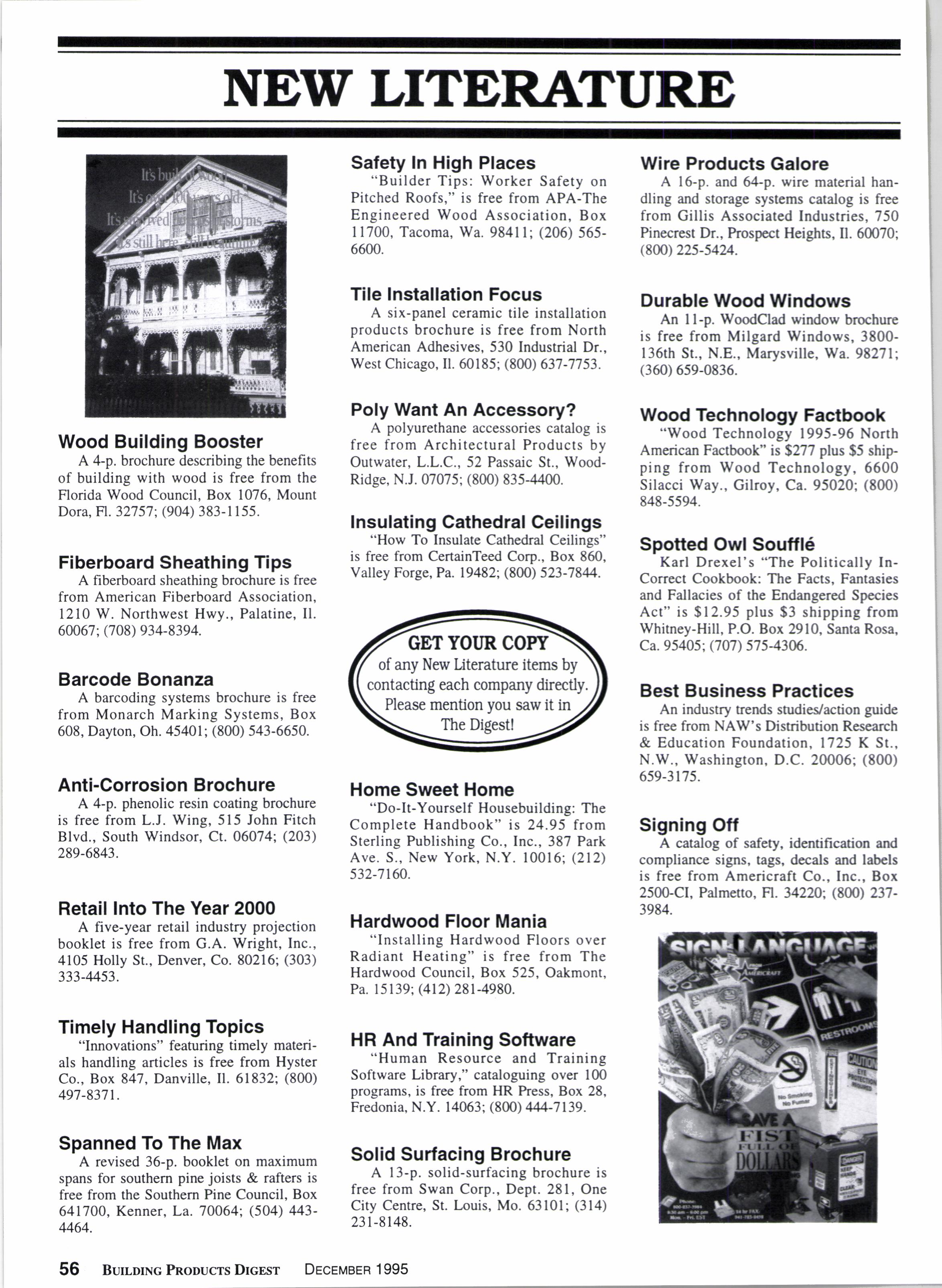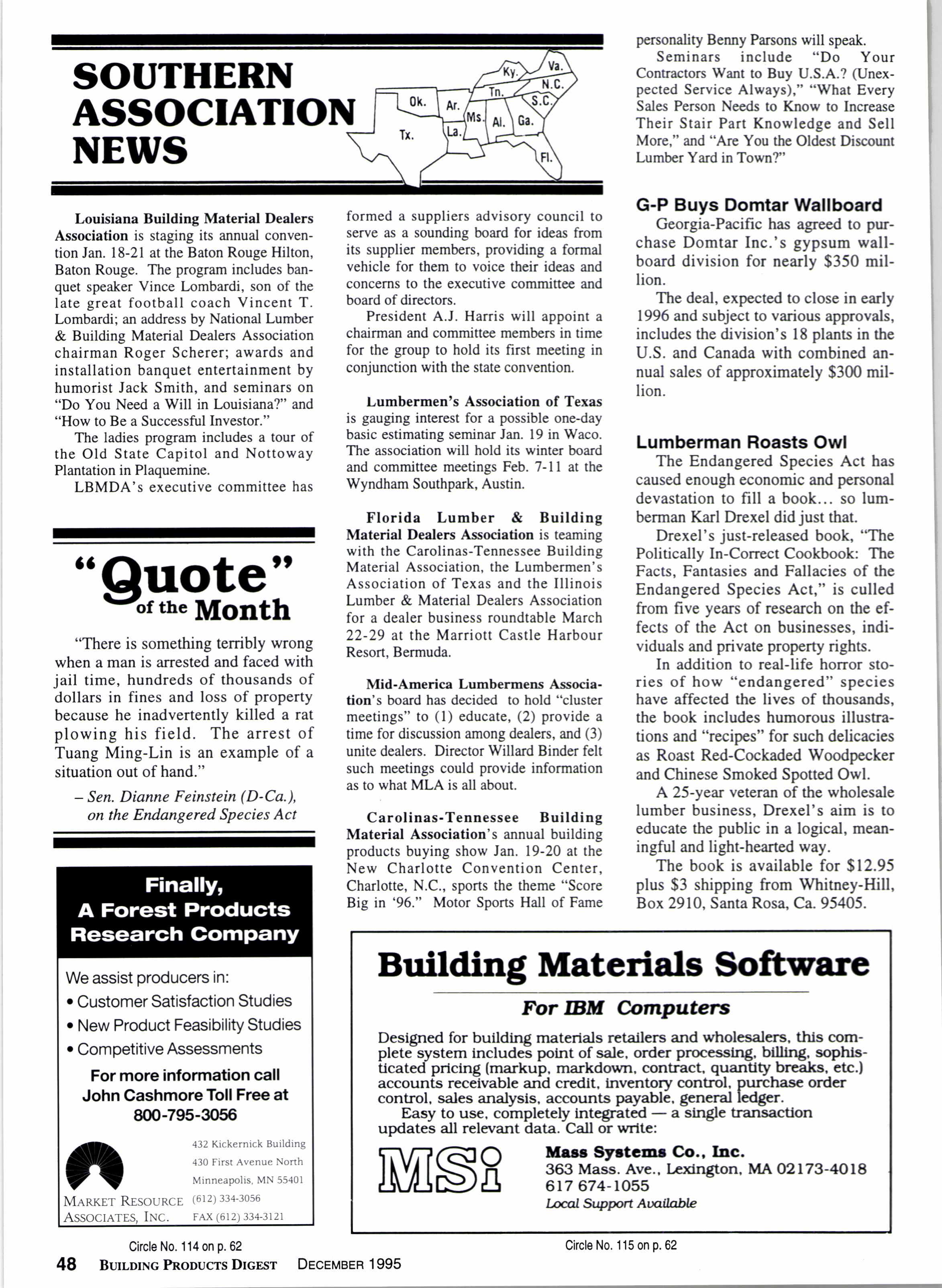
4 minute read
Miuo-rhips
Randy:F,arls :,:: : ,, Dimensions/Compril6ii:Advisors, Inc. salt Lft .cly; [Jt., ......,...'.., Founded in | 968; Dimensions/Conputer Advisors':::,gpagiaYpg,'t1xt, r solutions lor wholesale aN retail buHing material dealers throughout the Uni6d,States and Canada.
TI he past decade has seen barc,ode technology grow from staple status in our grocery stores to virtually all large retail concerns. With checkout lanes expected to keep pace with rising national speed limits, consumers and business alike prefer the benefits of faster, more accurate accounting of their purchases. But wait - the best is yet to come.
Recent advances in radio frequency gadgets promise change for anyone engaged in stocking, counting, tracking and selling inventory. Barcodes are nice, but what if you could sit at your desk and single-handedly "count" your entire inventory with the press of a button? Such technology exists today in the form of tiny radio transmitters that emit a constant signal to receivers in the store.
These devices, about l/4" square, are imbedded into products at the time of manufacture, and each device carries its own unique "signature," much like the electronic signature of a cellular phone. A hammer, therefore, would have a chip implanted into the handle which would identify it as a specific make and model just as barcodes do today.
Here is where the similarity ends, though, because in addition to broadcasting the make and model, these tiny transmitters also send a unique identity code letting the retailer know which Stanley Model X Deluxe Hammer is running through the checkout or sitting on the shelf. Imagine every item in your store broadcasting all day long to your computer in the back. You always know how many, and where they are; this is perpetual inventory in its truest form.
Let's let this technology solve a couple of other problems while we're at it. You like the speed of barcodes at checkout, right? How about placing a shopping cart under a specially designed "garage" and having the entire contents scanned in less than a second. Once scanned, those radio devices imbedded in the products "know" they've been sold, and their electronic signal changes slightly to allow the product to slip out the door without setting off your security scanner. Clothing and electronic retailers have implemented security tags on high-priced items for years, but there's been no simple, cost effective solution for the majority of items that populate the shelves of a typical hardgoods retailer.
There are other benefits as well. Since every single item is essentially coded with its own "serial number," the origin of returned goods would never be in question; either that particular hammer was once in your inventory or it wasn't. Receiving product at the back door would be as greasy (that's great and easy) as slipping it out the front. And of course, the savings in beer and pizza costs associated with all night/weekend inventory "parties" would fund a company get-together that people would actually like to come to.
The chips are small, the benefits huge. Today's price, however, is still bigger than the benefits. These little chips cost about fifty cents apiece, affordable for big ticket items only. As with all high+ech inventions, though, the price is headed south. In the next few years, manufacturers of the chips are confident they can produce mass quantities for a nickel or less, at which time everyone in the food chainmanufacturer, wholesaler, retailer and consumer - will save time and money far in excess of the costs of these little jewels.
Informarion managers
Jim Hassenstab Distdbution Managemenl Systems, lnc. Omaha, Ne.
DMSI is a supplier ol software to the wholesale building produds distnhution industry.
II believe the winners and losers in the building products distribution industry will be determined by who does the best job of managing information that is pertinent to their business. The winners will have real time information about all aspects of their business and will make getting that information by employees, customers or suppliers convenient. Following are my predictions as to the impact of technology in this area over the next one, five and l0 years.
One Year Forecast
Windows 95 will become the standard on desktop PCs. More and more building product retailers, distributors and manufacturers will embrace EDI (electronic data interchange) although it still will happen slowly.
More manufacturers will be labeling their products and wholesalers will increase their use of barcodes for controlling their inventory. Barcoding is a slow but sure technology.
Use of the Internet for E-mail and information exchange continues to increase at an ever faster pace. Manufacturers and distributors will communicate product specs, pricing changes, etc., to retailers via Internet.
Five Year Forecast
EDI explosion. Everyone is getting into the act and the Internet backbone is one of the reasons as it is carrying a lot of EDI documents.
Graphical workstations are in, dumb terminals are out. PCs are the preferred desktop workstation. Distributors are able to pull up a map of their trading area and see the exact location of their delivery trucks at any point in time, enabling them to communicate precise estimates as to delivery time to their customers.
Paperless businesses are a reality. Wireless warehouse automation systems are being adopted by progressive building product distributors. When combined with EDI document transmissions and electronic storage of documents (invoices, delivery tickets, etc.) on optical disk, paper becomes unnecessary.
Salesmen laptops are common. Retailers won't see too many distributor salesmen, but those they do see will be toting laptops. The salesman will be able to determine up to the minute product availability and pricing as well as place orders. Cellular modems will make this easy to do.
10 Year Forecast
EDI is old hat. Everyone is doing EDI to some extent. Paper is the exception, not the rule. Not much paper around most retailen or distributors. PCs with l0 times the power of today's are on everyone's desk running a Microsoft operating system.
E-mail to anyone, anywhere. From your desk you can send messages to and receive messages from anyone in the world, even if you are traveling. The Internet has evolved into a worldwide network with oversight by an international governing body that sets standards for its use. All the large phone companies are involved since long distance phone calls are being placed by instantaneous E-mail.
There is no question that technology is going to change the way building product retailers and distributors run their businesses. By embracing change as a way of life, you will be able to succeed in a world that is changing at a very rapid pace.









